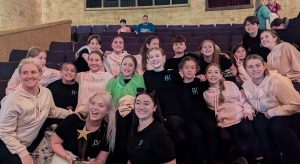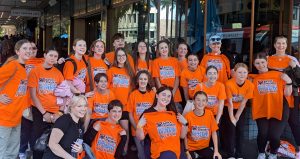Why We Don’t Do Competitions
Every so often, I’m asked why our students don’t compete in eisteddfods. For me, the answer lies in the benefits of auditions for children…experiences that build confidence, resilience, and collaboration in ways medals never could.
It’s not because I think competitions are bad. Many schools take their students to eisteddfods for tradition, motivation, or the thrill of performing under pressure. I respect that. It works for them. But when I looked at what I wanted for our students, the answer was clear. Dance is not a sport. Theatre is not a race. The arts are not about beating the person next to you. They are about collaboration, expression, and creativity.
At the heart of our academy is my belief that we shouldn’t do things just because they’ve always been done. Every decision has to serve a bigger purpose: preparing our students not only for the industry but for life.
That’s why I choose not to take them to competitions. I want their growth measured in confidence, resilience, and creativity. I want them to have authentic experiences, accessible opportunities, and a safe place to learn through both success and disappointment.
The Benefits of Auditions for Children
Of course, competition does exist in the performing arts. Auditioning for a role is, in many ways, a competitive process. You prepare your material, you walk into a room, and you give your best knowing there are limited roles to be cast.
And in most cases, it’s not simply about whether you’re good enough. It’s also about whether you fit the role and how well you balance with the rest of the cast. Are you tall enough to match your stage partner? Is your voice the right type for the song? Does your energy sit comfortably in the ensemble? Casting decisions often come down to these factors — things beyond talent or effort.
That’s why auditions are such powerful training grounds. The value of auditions for kids is huge. They teach students that success isn’t always about being “the best.” It’s about being prepared, being adaptable, and recognising that sometimes the outcome has nothing to do with you personally.
From my own experience, I can tell you this: in all my time sitting on audition panels for musicals, I have never once asked a performer how many trophies they’ve won. When I review applications for our training programs, I’ve never cared how many gold medals a student has collected. If anything, that can be off-putting. It tells me a student has been trained to compete — but not necessarily to collaborate.
What matters in that room is simple: are they prepared, open, resilient, and willing to support the people around them? That’s what theatre is built on.
Preparing Kids for the Real World Through Auditions
Outside of the arts, auditions look a lot like real life. They’re not so different from pitching an idea in a marketing meeting, presenting a project at work, or sitting in a job interview. You prepare, you manage your nerves, and you give the best of yourself in that moment.
Sometimes you get the opportunity. Sometimes you don’t. Either way, the process builds resilience and confidence.
That’s what I want my students to take away. They’re not just rehearsing for the stage — they’re rehearsing for life. They’re learning how to manage pressure, how to take feedback, and how to keep moving forward no matter what the outcome is. And this is one of the most important benefits of auditions for children in the performing arts.
What I Choose Instead
So what do we do instead of competitions? We participate in non-competitive performing arts. We create. We rehearse. We perform. Our energy goes into productions, showcases, and projects where students get to tell stories, support their peers, and discover their own voices. This is why auditions matter for children.
And in October, we’re heading to the Junior Theatre Festival in Newcastle. JTF isn’t about medals or placings — it’s about celebrating young people in musical theatre. Students from across the country come together to perform, learn from industry professionals, and inspire one another. That’s the kind of experience I want for my students: one built on joy, community, and growth.


So What Does This Mean?
If your child is part of our school, their weekends won’t be spent chasing trophies. They’ll be creating memories. They’ll be learning to stand tall in auditions, to celebrate the ensemble, and to find joy in the process.
I’m not against competition. I simply choose a different path. A path where art is celebrated, not ranked. Where growth is measured not in medals, but in confidence. Where students learn that their worth isn’t found in beating others, but in discovering who they are and what they have to share.
That’s the stage I want them to grow up on.
Lee Valmy
Founder & Director, Valmy Academy
